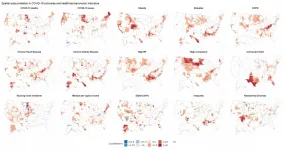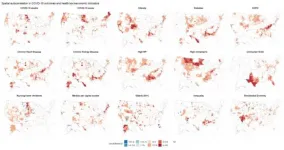"Long COVID": More than a quarter of COVID-19 patients still symptomatic after 6 months
55% of "Long COVID" sufferers reported fatigue, 25% had shortness of breath, and 26% had symptoms of depression
2021-07-13
(Press-News.org) In a new study of adults from the general population who were infected with COVID-19 in 2020, more than a quarter report not having fully recovered after six to eight months. Those findings are described this week in the open-access journal PLOS ONE by Milo Puhan and colleagues at the University of Zurich, Switzerland.
While initial public health responses to the SARS-CoV-2 virus focused on reducing the acute burden of COVID-19, a growing body of evidence indicates that the infection can also result in longer-term physical and mental health consequences. These long-term consequences, currently referred to as "post-COVID-19 syndrome" or "Long Covid" are of increasing concern for healthcare systems.
In the new study, researchers recruited 431 participants from within the contact tracing system in Zurich, Switzerland. All participants had tested positive for SARS-CoV-2 between February and August 2020, and completed an online questionnaire about their health a median of 7.2 months after their diagnosis. Symptoms had been present at diagnosis in 89% of the participants and 19% were initially hospitalized. Compared to individuals not participating in the study, participants were younger--with an average age of 47.
Overall, 26% of participants reported that they had not fully recovered at six to eight months after initial COVID-19 diagnosis. 55% reported symptoms of fatigue, 25% had some degree of shortness of breath, and 26% had symptoms of depression. A higher percentage of females and initially hospitalized patients reported not having recovered compared to males and non-hospitalized individuals. A total of 40% of participants reported at least one general practitioner visit related to COVID-19 after their acute illness. The authors say that their findings underscore the need for the timely planning of resources and patient services for post-COVID-19 care.
The authors add: "This cohort study based on a respresentative, population-based sample of SARS-CoV-2 infected individuals found that 26% did not fully recover within 6-8 months after diagnosis and 40% had at least one further healthcare contact related to COVID-19. These findings underline the need for the timely planning of healthcare resources and services tailored to the needs of individuals suffering from post-COVID-19 syndrome."
INFORMATION:
Citation:
Menges D, Ballouz T, Anagnostopoulos A, Aschmann HE, Domenghino A, Fehr JS, et al. (2021) Burden of post-COVID-19 syndrome and implications for healthcare service planning: A population-based cohort study. PLoS ONE 16(7): e0254523. https://doi.org/10.1371/journal.pone.0254523
Funding:
The Zurich SARS-CoV-2 Cohort study is part of the Corona Immunitas research program, coordinated by the Swiss School of Public Health (SSPH+) and funded through SSPH+ fundraising, including funding by the Swiss Federal Office of Public Health, the Cantons of Switzerland (Basel, Vaud and Zurich), private funders (ethical guidelines for funding stated by SSPH+ were respected) and institutional funds of the participating universities. Additional funding specific to this study was provided by the Department of Health of the Canton of Zurich and the University of Zurich Foundation. Study funders had no role in study design, data collection and analysis, interpretation, decision to publish or preparation of this manuscript.
Competing Interests:
The authors have declared that no competing interests exist.
In your coverage please use this URL to provide access to the freely available article in PLOS ONE:
https://journals.plos.org/plosone/article?id=10.1371/journal.pone.0254523
ELSE PRESS RELEASES FROM THIS DATE:
2021-07-13
COVID-19 vaccination strategies in the United States are informed by individual characteristics such as age and occupation. A study published in the open access journal PLOS Medicine by Sasikiran Kandula and Jeffrey Shaman of Columbia University, New York, United States suggests that including socioeconomic indicators as prioritization criteria for vaccination may help minimize severe outcomes, particularly deaths.
Efforts to reduce COVID-19 mortality rates in the US have focused on prioritizing vaccination initially for those at a higher risk of severe outcomes. The effectiveness of population-level ...
2021-07-13
An estimated 43 percent of the variability in U.S. COVID-19 mortality is linked with county-level socioeconomic indicators and health vulnerabilities, with the strongest association seen in the proportions of people living with chronic kidney disease and living in nursing homes. The study by Columbia University Mailman School of Public Health researchers suggests that allocating vaccines based on these factors could help minimize severe outcomes, particularly deaths. Results are published in the open-access journal PLOS Medicine.
"It is well known that COVID-19 deaths are concentrated in communities with underlying ...
2021-07-13
Researchers have conducted a global study on the effectiveness of recently established protected areas in preventing forest loss
The study explores protected area performance by countries, with South Africa, Cambodia, Latvia, Guatemala, Uruguay, Brazil and New Zealand leading the way in the effectiveness of their protected areas
The research team estimated that overall, protected areas established between 2000-2012 prevented 86,062 square kilometers of forest loss
If all countries had protected areas that were as effective as their top-performing neighbor, then an additional 33,020 square kilometers of forests would have been saved
Machine learning found that agricultural ...
2021-07-13
The University of Alberta-led research followed more than 400 infants from the CHILD Cohort Study (CHILD) at its Edmonton site. Boys with a gut bacterial composition that was high in the bacteria Bacteroidetes at one year of age were found to have more advanced cognition and language skills one year later. The finding was specific to male children.
"It's well known that female children score higher (at early ages), especially in cognition and language," said Anita Kozyrskyj, a professor of pediatrics at the U of A and principal investigator of the SyMBIOTA (Synergy in Microbiota) laboratory. "But when it comes to gut microbial ...
2021-07-13
Children exposed to elevated levels of air pollution may be more likely to have poor inhibitory control during late childhood and poor academic skills in early adolescence, including spelling, reading comprehension, and math skills. Difficulty with inhibition in late childhood was found to be a precursor to later air pollution-related academic problems. Interventions that target inhibitory control might improve outcomes.
Results of the study by researchers at the Columbia Center for Children's Environmental Health (CCCEH) at Columbia University Mailman School of Public Health and Columbia University Irving Medical Center are published in the journal Environmental ...
2021-07-13
Compared with heterosexual smokers, menthol cigarette smoking is higher among lesbian, gay and bisexual cigarette smokers, according to a Rutgers-led study, especially among bisexual and lesbian/gay female cigarette smokers.
The study, published in the journal Nicotine & Tobacco Research, examined national data from 2015 to 2019 of individuals ages 18 years and older by sex and sexual identity and found that among smokers, 54 and 50 percent of bisexual and lesbian/gay females smokers preferred menthol cigarettes, respectively, compared with 39 percent of smokers overall.
This study comes in the wake of plans by the U.S. Food and Drug Administration to ban menthol cigarettes; a move that researchers say is ...
2021-07-13
Information-rich optical imaging can provide multidimensional information to enable observation and analysis of a detected target, contributing insights into mysterious and unknown worlds. With its ability to capture dynamic scenes on picosecond—and even femtosecond—timescales, ultrafast multidimensional optical imaging has important applications in the detection of the ultrafast phenomena in physics, chemistry, and biology.
While pump-probe-based ultrafast imaging can acquire high-resolution multidimensional information, it cannot adequately capture unstable or irreversible transient scenes. Fortunately, compressed ultrafast photography (CUP), based ...
2021-07-13
A decade after scientists discovered that lab rats will rescue a fellow rat in distress, but not a rat they consider an outsider, new research from the University of California, Berkeley, pinpoints the brain regions that drive rats to prioritize their nearest and dearest in times of crisis. It also suggests humans may share the same neural bias.
The findings, published today, Tuesday, July 13, in the journal eLife, suggest that altruism, whether in rodents or humans, is motivated by social bonding and familiarity rather than sympathy or guilt.
"We have found that the group identity ...
2021-07-13
JUPITER, FL - The brain is wired for learning. With each experience, our neurons branch out to make new connections, laying down the circuitry of our long-term memories. Scientists call this trait plasticity, referring to an ability to adapt and change with experience.
For plasticity to happen, our neurons' synapses, or connection points, must constantly remodel and adapt, too. The mechanics underlying neurons' synaptic plasticity have become clearer, thanks to new research from the lab of Scripps Research neuroscientist Sathya Puthanveettil, PhD.
Scientists have learned that synaptic plasticity requires a complex relay from the neuron's cell body to its dendrite arms and its synapse junctions. Like a 24-hour port and highway network, an internal ...
2021-07-13
ITHACA, N.Y. - Direct farm marketing efforts, such as farmers markets and roadside stands, are more successful in communities with more nonprofits, social enterprises and creative industries, according to a team including Cornell University researchers, who created a nationwide database of assets to help municipalities craft community-specific development plans.
While many municipalities seek to encourage direct-to-consumer (DTC) marketing - an important factor in farmers' livelihoods - the success of their efforts hinges on a wide array of community resources, or capital assets, with natural and cultural ...
LAST 30 PRESS RELEASES:
[Press-News.org] "Long COVID": More than a quarter of COVID-19 patients still symptomatic after 6 months
55% of "Long COVID" sufferers reported fatigue, 25% had shortness of breath, and 26% had symptoms of depression





